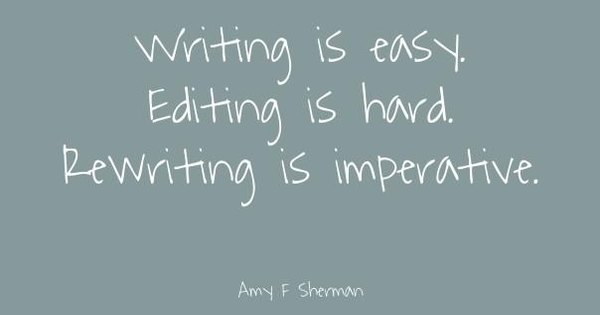Natalie Hanemann, Jessica Stewart, Sharon Athas, Una Verdandi, Penny Cockerill, Jess Cox, Adrienne Moch, Elisabeth Kauffman

In part one of the article, 6 of the best Writers Boon editors, shared their best revision tips and taught us how to go about the rewriting process. Sure they were all right, but so was the great Dorothy Parker when she said, "writing is the art of applying the ass to the seat." I guess it applies to revision too.
Today, we continue with more helpful tips that hopefully will make the daunting task of book revision less frustrating and a little more fun.
We are joined by the following amazing book editors: Natalie Hanemann, Jessica Stewart, Sharon Athas, Una Verdandi, Penny Cockerill, Jess Cox, Adrienne Moch, Elisabeth Kauffman.
1. Spend time working and reworking your first chapter.
That one sentence sounded genius the first time you wrote it. What about now? Ask yourself, does it grab the reader’s attention?
For inspiration, take a look at these 100 best first lines from novels.
Don’t cut corners! Spend time working and reworking your first chapter so it’s fast-paced, has action, and shows the uniqueness of your protagonist. It doesn’t matter how good the rest of the book is, if chapter one doesn’t hook the reader, they won’t keep reading. --Natalie Hanemann
2. Use the delete key.
Jessica Stewart advises authors to look at every word in every sentence and ask themselves, ‘Does this add to my story, or does it detract?’
Be vigilant about repetition. Take it all out. Look for and remove words which describe an action, instead of showing its effects:
‘She realised she was running late and picked up speed…’, instead of ‘Running late, she picked up speed …’.
By removing them, you bring the reader closer to the characters’ experiences.
When you have removed every piece of clutter, every word that is extraneous that distracts the reader from your characters, your plot, or your themes, you are finished (this stage).”
Sharon Athas agrees:
-
Be brave, be brutal. Ensure every paragraph advances the story or reveals character. Eliminate unnecessary prose.
-
Glean the structure. What are the key actions and turning points in the story, in the chapter? Is there too much exposition between scenes? Revisit characterisation and motivation. Make imaginative choices, keep it tight.
-
Check tone and consistency. Ensure the intended atmosphere is still on target.
Don’t be afraid of kill your darlings when they are no longer your darlings.
Delete all common writing clichés.
Be the assassin of catastrophic sentences.
3. How many rounds of revisions should you go through?
Revising a novel isn't a one-pass job. Do at least one round of substantive revisions to clean up plot, characterization, setting, etc. before handing your manuscript to beta readers or a substantive editor. Don't touch the manuscript again until you get everyone's comments and have had time to think about them. When you're ready, make changes to address your readers' concerns, and then one more pass to focus on sentence/paragraph structure and flow, word choice, clarity, descriptiveness, etc. After that, get yourself a copy editor. You can drive yourself nuts trying to decide when your book is done. You should get the opinions of readers and editors before trying to make that decision. --Una Verdandi
Stop tinkering and over-editing. If you have been editing for months, or editing one element repeatedly, just stop. Accept that your novel is as ready as it's going to be, and go for gold! --Sharon Athas
First read through from beginning to end, to see your novel as a whole.Then look for any areas which are under- or over-developed, which may spoil the balance and consistency of the book. Once you are happy with the flow and feel that you have succeeded in telling your story as you wished, have another read to check consistency in your characters, plot, narrative and language, checking references to real people, dates, events and quotations. --Penny Cockerill
4. How do you know when enough is enough?
It can seem never-ending. Draft after draft, revision after revision … when will you know it's ready?
Jess Cox offers a few helpful suggestions:
- You’re no longer waking up in the middle of the night, thinking about subplots to add, characters to refine or dialogue to excise.
- You’re fiddling with commas or individual words. Don’t get lost in editing purgatory. Let it go.
- From broad brushstrokes of plot to fine details of character, from dabs of dialogue to … Uh oh, is that making things better or worse? Stop now.
- Finally, it comes down to intuition. It’s your creation, after all, and if you don’t think you can improve on it, your writing work is done.
Set a date to have all revisions completed and stick to it — or you can fall into an endless revision cycle that may result in overworked copy. --Adrienne Moch
Sharing something you’ve written is scary, but your voice is important. Your story matters. Don’t revise it to death because you’re afraid it’s not good enough. Take a couple passes to nail down the scenes, plot, and characters. Next, hand it over to fresh eyes (beta-readers or a content editor), to find out what you’re missing. After you’re satisfied you’ve addressed any issues they raise (i.e., places they were bored, confusing dialogue, or plot holes), polish it off with a professional copyedit and proofread. Then take a deep and send your story out into the world. --Elisabeth Kauffman
Get over the overwhelming fear that you are the worst writer in history.
Tip of the Day:
If you're a writer in need of an experienced editor, but you would like to minimize your editing costs, please take a look at Writers Boon discounted marketplace. You will find amazing editors who worked with authors from the Big 5 Publishing houses willing to offer 15% to 30% discount on their regular fees.